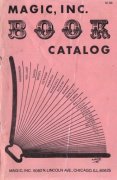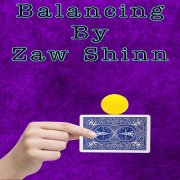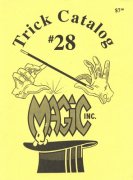Magic & Mentalism: page 375
Subtopics
Mentalism & Spiritism Cards Magazines & Journals with Demo Video DVD (download+stream) DIY, Makers & Builders Books (printed) Video clips (download) Theory, Articles & Reviews for Beginners Coins, Chips & Buttons Illusions, Escape & Stage Biographies & History in German (Deutsch) Marketing, Selling & Business Matters Audio Balls, Eggs, Dice & Cups Memory & Mnemonics Science & Math Tricks Paper & Paper Money Ropes, Ribbons, Strings & Reels Comedy Magic Physical (Non-Digital) Tricks & Gimmicks Patter, Plots & Scripts Compilations in Italian (italiano) Kids & Children Hypnosis & NLP Rings Cigarettes, Candles, Matches & Fire Liquids, Chemicals & Bottles Phone, Apps & eTricks Published 1800-1899 Silks & Flags DVD & Video (disc) Hands, Fingers & Body Thimbles Catalogs Published before 1800 Chapeaugraphy Instruction Sheets Ventriloquism in French (français) in Spanish (español) Second Hand Animals Gospel Magic Gift Cards & Donations Pickpocket Fiction for Resellers Free in Japanese (日本の)Authors
Products
Discoveries: NEMCA Newsletter Volume 1 Number 3 (July - September 2022)
NEMCA: New England Magic Collectors Association
- About Discoveries
- From the President's Desk
- Featured Cover Photo
- Newsletter Name Contest
- Member Spotlight - Eric Gagne
- Welcome New Members
- A Retelling from the Past
- New Arrivals
- The Process of Collecting
- Solve the Mystery!
- Review - "Ionia: Magician Princess, Secrets Unlocked"
- Online Resources for Magic Collecting
- "Puzzling Props"
- 2022 Yankee Gathering Update
- Yankee Gathering Auction Changes
- Registration Raffle for YG 2022
- Upcoming Events
- Highs and Lows - Selected Auction Results
- Volunteer Request - Video Editing
- Classifieds
The editor is Patrick Lusch. The title has...
Tell-Tell Watches
Devin Knight & Ulysses Frederick Grant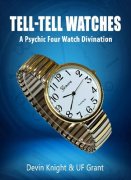
EFFECT: Any three people take ordinary watches the performer provides to a far corner of the room and set them to any hour and minute. They in turn each wrap their watch in a small opaque paper bag. These are placed anywhere and you can divine the exact hour and minute on each watch. No gimmicked watches or electronics are used. At the end, everything can be fully examined and nothing will be found amiss.
1st edition 2022, PDF 7 pages.
The Life of a Showman
David Prince Miller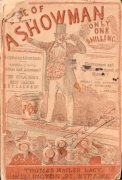
This is a wonderful account of a traveling showman's trials and tribulations in England and Scotland during the middle of the 19th century. Among other things, he was a conjurer. While this is not a book of tricks, one coin trick is explained as part of one story of his life. But much more interesting are the descriptions of various scams and the modus operandi of various ways to defraud the public by traveling hucksters the author encountered. The operation of the thimble rig is explained in detail. It is an account of how traveling showmen struggled essentially their entire life to make...
Rub-a-Dub Digest
Jon Racherbaumer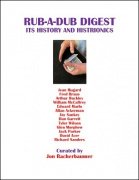
ABOUT RUB-A-DUB: The rhyme is of a type calling out otherwise respectable people for disrespectable actions, in this case, ogling naked ladies - the maids. The nonsense "Rub-a-dub-dub" develops a phonetic association of social disapprobation, analogous to "tsk-tsk," albeit of a more lascivious variety.
The Rub-a-Dub Move's inauspicious beginning began in 1909 at a time when, relatively speaking, magicians had a limited number of utilitarian sleights and techniques at their disposal. Besides, the Rub-a-Dub Move happened in the blink of an eye and was only an offbeat way to make a card disappear. ...
MINT VI Unauthorized
Edward Marlo & Wesley James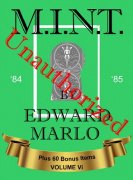
More than the fourteen major Marlo items Ed contributed to New Tops Magazine between 1984-1985 - not to mention new sleights, finesses, and subtleties - these items have been largely unavailable since their publication, almost 40 years ago. Wesley James has added these final two years of material, completing the full run of Marlo's New Tops articles, fulfilling Ed's expressed wishes, keeping his material available "for the guys."
As with Wesley's previous releases, M.I.N.T. III - M.I.N.T. V, these long-unavailable Marlo articles could have been all Wesley compiled. Such a volume would have been an important...
Thought Shadows
Unknown Mentalist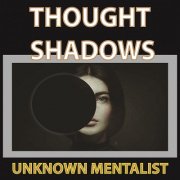
Thought Shadows is a dramatic and visual piece of mentalism. It uses a novel presentational concept that even our thoughts can have shadows and based on those shadows a skilled mind reader can read the thoughts behind the shadows.
Everything happens in the mind of the participant and on the mobile phone of the participant. Nothing is ever spoken or written down. The participant just needs to have a phone with Google search on it. No special apps are needed on the phone. And the one piece of paper which is required to complete the routine is carried by the performer in his wallet or pocket....
The Love
Zaw Shinn & Hninn Aye Lwin
Performer shows the red back of a playing card. One can see a heart and an arrow is drawn on the back. Suddenly the arrow slowly flies towards the heart until it penetrates it. In the final climax the color of the red card changes to blue. Making the gimmicked card requires arts and crafts.
Special thanks to Patricio Teran for helping to release this effect.
1st edition 2022, video 36:59.
Magic Inc. Book Catalog 1968
Frances Marshall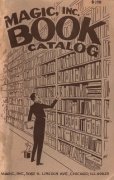
This catalog is great because not only does it list various books in different categories, it also features informative articles. The articles you will find are:
- Building a Collection / Leo Behnke
- Are Magic Books Worthwhile? / John Mulholland
- Books about Books / Robert Lund
- The Calculated Risk / Dr. Edwin A. Dawes
- Magical Bookie / S. R. Patrick
- The Magician and Comedy / Robert Orben
- Quest for Magic Books / George Jenness
- Buy Lines / J. B. Findlay
1st edition 1968; PDF 147 pages.
The Sharpie Miracle
Graham Hey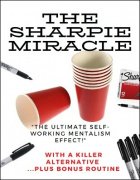
Six Sharpies are placed under 6 numbered, identical paper cups. While the performer turns away, a spectator removes a Sharpie from any cup and writes down the number of the cup they selected. They place the paper in their pocket and replace the Sharpie back under the cup. The magician can instantly reveal which number cup they took the Sharpie from. 100% self-working. Nothing is marked. A simple gimmick you may already have does the trick.
Also included is The Pencil Case Mystery which is a brilliant variation on the above routine. 6 pencil cases each contain a different colored Sharpie....
Capsoul
Deepak Mishra
Turn a cap into a magic prop and have cards appear and change. For example, you can use it for a kind of 'card stabbing' routine where you spring the cards and catch one card in your cap. Or have one card visually change into another. To make the gimmicks requires some arts and crafts, but nothing too complicated and no supplies you wouldn't likely already have.
The separate effects are:
- Flick
- Stabbed
- I-tap
- Spinner
Not all gimmicks can be incorporated into the same cap and thus not all effects shown could be done with just one cap.
Deepak also explains a lovely linking effect...
The Bookworm Deck
David Devlin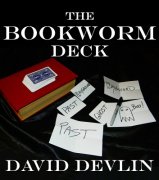
If you liked Bookworm: The Ultimate Impromptu Book Test Act, then you will love The Bookworm Deck. An entire "Word Test Act" combined into a single deck that you will always carry with you.
Not only can you now perform the "Bookworm Act" without having to borrow three books, you can perform the act in absolutely any venue, including walk-around, table hopping, and even stage situations. The entire act is kept in your pocket. The Bookworm Deck also makes the act much easier to perform.
Here is the act:
The performer borrows three business cards and a pen (obviously, he can use his own if the items cannot be borrowed). The performer...
Radio Magic: Interviews Season 1
Jay Fortune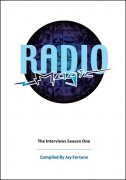 "I created Radio Magic way back in 2005 and interviewed many of the world's top magicians alongside lesser known but fascinating talent including the producer of BBCs The History of Magic. In hindsight, with the shows on 24-hour demand repeat at that time, we were podcasting before podcasts! I'm proud of this book and delighted to offer it as an eBook exclusively with Lybrary.com." - Jay Fortune.
"I created Radio Magic way back in 2005 and interviewed many of the world's top magicians alongside lesser known but fascinating talent including the producer of BBCs The History of Magic. In hindsight, with the shows on 24-hour demand repeat at that time, we were podcasting before podcasts! I'm proud of this book and delighted to offer it as an eBook exclusively with Lybrary.com." - Jay Fortune.
Own a piece of magic history!
In July 2005, Jay Fortune and radio presenter Layman Steve hit the airwaves live from London with Radio Magic; a lively hour-long radio show dedicated to magic and...
Manosutra
Unknown Mentalist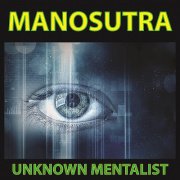
Manosutra in Sanskrit means 'Mind Principle'. This is a stunning piece that you can include in any of your performance sets. Using just a few blank business cards, you can impossibly read the minds of your participants. The reactions will please your heart and boost your ego. Everything happens in the mind of the participant and yet the performer is able to divine the thought of the participant in the most direct manner.
There is a one-time preparation of a few double blank business cards which will take all of 3 minutes and you are then set for many performances - until these cards wear...
Spelling: Letters or Numbers?
Renzo Grosso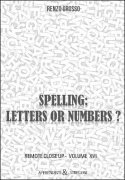
I saw the first spelling effects a long time ago, studying Aldo Colombini's DVDs; they were in English and I gave up almost immediately, due to the great difference in seed letters and numbers: from diamonds to diamonds there was an ocean. I saw, I appreciated them ... and then I gave up. Some time later, trying and trying again, a light bulb came on: I thought I had invented my spelling in Italian; beautiful exceptional. Later I discovered that I had not really invented anything, there were dozens and hundreds of similar and ... almost the same. Then, continuing to study the great masters, I began to collect...
Shake
Zaw Shinn
A magician holds a card and then changes it to a poker chip, paper money, a coin, or any small flat object. The method is based on a black-art principle and thus best suited for a stage or video performance where lighting and angles can be controlled well. Making the gimmick involves arts and crafts.
1st edition 2022, video 23:04.
Variations on an ESP Theme
Russell J. Hall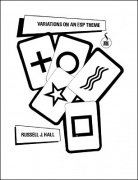
Excerpt from the introduction:
Being made up of five symbols repeated five times, the standard ESP pack is ideally suited to coincidence-type effects. For some time I've used a number of effects based on a coincidence or 'linked minds' theme which involved the selection of two or three symbols, apparently at random, which later turned out to be identical. It occurred to me recently, however, that there was scope for extending the principle to include all five cards of any particular symbol.
- Symbol synchronicity
- The Rhine reaction
- Zenner mate
- ESP topper
- ESP round-up
- Down-under divination ...
How to Tell Fortunes
Frank Tousey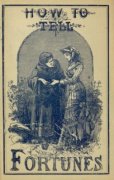
Containing Napoleon's Oraculum, and the key to work it. Also tells fortunes by cards, lucky and unlucky days, signs and omens.
- How To Tell Fortunes By Cards
- Signification Of The Cards
- Signification Of Different Cards Of The Same Denomination
- Dealing The Cards By Threes
- Dealing The Cards By Sevens
- Dealing The Cards By Fifteens
- The Italian Method
- Present, Past, And Future
- The Star Method Of Consulting The Cards
- To Know If You Will Get Your Wish
- The English Method Of Consulting The Cards
- To Tell Whether You Will Get Your Wish
- Good And Bad Omens
- Concluding Remarks
- Weather...
Sui Generis
Fraser Parker
"This is on a whole different level than any of his previous work". - Ori Asher
Sui Generis is a breakthrough system for guessing any word entirely propless. It allows for what is essentially a mental billet peek, without the need for anything to be written down by your spectator. Fraser has searched for this work all of his life and is something he considers his best work to date and a crowning achievement in the mystery arts.
There is very little process, everything is justified presentationally, and the method is practically self-working and will become second nature to perform...
Chemistry Lessons: oil, water, moves and math?
Renzo Grosso
Water and oil is an effect that has always fascinated me, but the principle is so simple that I think it is impossible to invent something more effective; moreover, the effect requires a secret manipulation that is impossible to replicate, if everything is expected to be done in the hands of the spectator, "on the other end of the line" (of the telephone).
I, therefore, followed a different path: to try to replicate, in the spectator, the amazement of finding the separated cards, when they were arranged alternately by his hands, in front of his eyes.
Also in this publication I propose,...
DNA Clinic
Graham Hey
"Graham Hey is a master at taking long-forgotten methods and turning them in to modern gold! And D.N.A Clinic is fabulous!" says Mike McClean - one of the World's top comedy mentalists.
The effect titled 'D.N.A clinic' is a comedy card routine that involves the spectator freely selecting a card which they then rub over their body to make sure they add a little of their D.N.A on to it - this will help the magician find their card, as they've been attending a D.N.A evening class. Not only does he find the card, but the rest of the deck is also revealed to be completely blank. No forces, no...
Magic Inc. Trick Catalog #24
Frances Marshall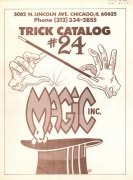
Excerpt from the introduction:
Welcome to the world of MAGIC! It is one of the oldest performing arts and yet it is as up to date as tomorrow. You have been seeing some wonderful magical spectaculars on TV, with Henning, Blackstone, Copperfield and others and you know how great magic can be. Magic is important and it can make YOU important. You can learn all about the great magicians of the past, study the art of magic so you can learn to be a performer, and meet and know the great magicians of today. New books are constantly being issued on magic and there are hundreds of them already established...
